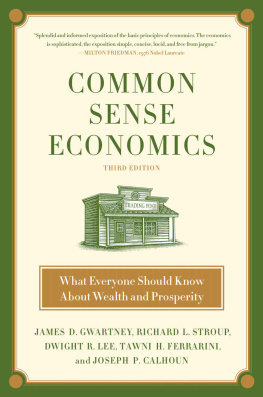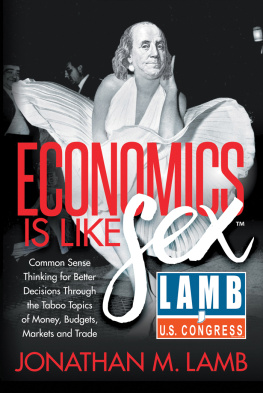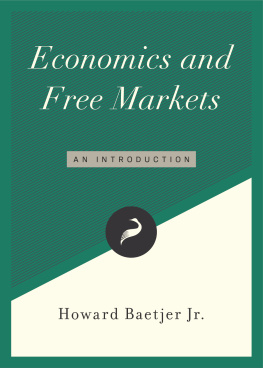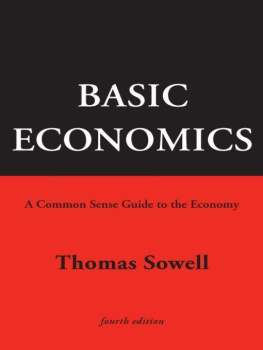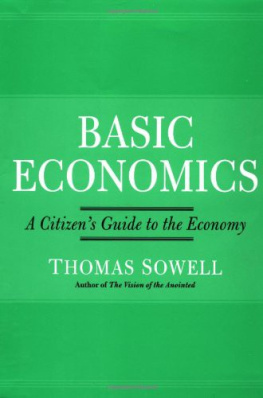
Thank you for buying this
St. Martins Press ebook.
To receive special offers, bonus content,
and info on new releases and other great reads,
sign up for our newsletters.

Or visit us online at
us.macmillan.com/newslettersignup
For email updates on James D. Gwartney, click here.
For email updates on Richard L. Stroup, click here.
For email updates on Dwight R. Lee, click here.
For email updates on Tawni H. Ferrarini, click here.
Please note that some of the links referenced in this work are no longer active.
The author and publisher have provided this e-book to you for your personal use only. You may not make this e-book publicly available in any way. Copyright infringement is against the law. If you believe the copy of this e-book you are reading infringes on the authors copyright, please notify the publisher at: us.macmillanusa.com/piracy.
Dedicated to our students, past, present, and future
The authors of this book want you to live a successful and fulfilling life. We also want to enhance your understanding of our fast-changing world. Because your time is valuable, we have crafted this publication in a way that minimizes the time spent learning new terms, memorizing formulas, or mastering intricate details important only to professional economists. Rather, we focus on the general insights of economics that really matterthose that will help you make better choices, improve your understanding of our increasingly complex world, and live a more satisfying life.
Regardless of your current knowledge of economics, this book will provide you with important insights. It is concise, thoughtfully organized, and reader-friendly. It introduces the basic principles of economics, which primarily reflect common sense. The book then puts the principles to work, demonstrating their power to explain real world events and improve our personal decision-making.
The book explains why some nations prosper and others do not. The political process is examined and differences between government and market allocation investigated. Even advanced students of economics and business will find this book valuable because it pulls together the big picture. You can temporarily set aside the complex formulas, sophisticated models, and technical mathematics of the profession and concentrate on the economic principles that attracted you to economics in the first place.
You will be introduced to a variety of easy-to-use online calculators, spreadsheets, and websites, which will help you take important steps toward financial security. You will be challenged to think about your preferences, choices, and goals. You will also be provided with tools to improve the quality of your life and the value of the services you provide to others.
The authorsthe Common Sense Economics teamare all economic educators. If you are an economics instructor, we want to help you become a great teacher. To that end, we have developed a multimedia course package to accompany the book. The package takes into account the revealed learning preferences of todays multimedia students. It includes short video clips, classic readings, podcasts, innovative assignments, and interactive classroom activities. Visit CommonSenseEconomics.com for details.
The supplementary package accompanying the book is the result of a long-term collaboration with a team of master economic educators dedicated to compiling everything an instructor needs for an exciting introductory course. It incorporates the read, watch, listen, and do approach that will help you engage your students and get them excited about economics and personal finance. The book and package meet voluntary K-12 standards and benchmarks. The materials are designed to provide a strong foundation especially for students who may not go on to take another economics course.
Because the Common Sense Economics team is anxious to share these materials with economics and personal finance instructors, we offer online courses and special workshops throughout the country. These introduce the full package to teachers and help them learn how to use its content most effectively. If you would like more information on these activities, please consult CommonSenseEconomics.com.
TWELVE KEY ELEMENTS OF ECONOMICS
1. Incentives matter: Changes in benefits and costs will influence choices in a predictable manner.
2. There is no such thing as a free lunch: Goods are scarce and therefore we have to make choices.
3. Decisions are made at the margin: If we want to get the most out of our resources, options should be chosen only when the marginal benefits exceed the marginal cost.
4. Trade promotes economic progress.
5. Transaction costs are an obstacle to trade.
6. Prices bring the choices of buyers and sellers into balance.
7. Profits direct businesses toward productive activities that increase the value of resources, while losses direct them away from wasteful activities that reduce resource value.
8. People earn income by providing others with things they value.
9. Production of goods and services people value, not just jobs, provides the source of high living standards.
10. Economic progress comes primarily through trade, investment, better ways of doing things, and sound economic institutions.
11. The invisible hand of market prices directs buyers and sellers toward activities that promote the general welfare.
12. Too often long-term consequences, or the secondary effects, of an action are ignored.
Introduction
Life is about choices, and economics is about how incentives affect those choices and shape our lives. Choices about our education, how we spend and invest, what we do in the workplace, and many other personal decisions will influence our well-being and quality of life. Moreover, the choices we make as voters and citizens affect the laws or rules of the game, and these rules exert an enormous impact on our freedom and prosperity. To choose intelligently, both for ourselves and for society generally, we must understand some basic principles about how people choose, what motivates their actions, and how their actions influence their personal welfare and that of others. Thus, economics is about human decision-making, the analysis of the forces underlying choice, and the implications for how societies work.
The economic way of thinking involves the integration of key concepts into your thought process. The following section presents twelve concepts that are crucial for the understanding of economies, and why some countries grow and achieve high income levels while others stagnate and remain poor. You will learn such things as the true meaning of costs, why prices matter, how trade furthers prosperity, and why production of things people value underpins our standard of living. In the subsequent parts of the book, these concepts will be used to address other vitally important topics.
1. Incentives matter: Changes in benefits and costs will influence choices in a predictable manner.
All of economics rests on one simple principle: Changes in incentives influence human behavior in predictable ways. Both monetary and nonmonetary factors influence incentives. If something becomes more costly, people will be less likely to choose it. Correspondingly, when the benefits derived from an option increase, people will be more likely to choose it. This simple idea, sometimes called the basic postulate of economics, is a powerful tool because it applies to almost everything that we do.
Next page
